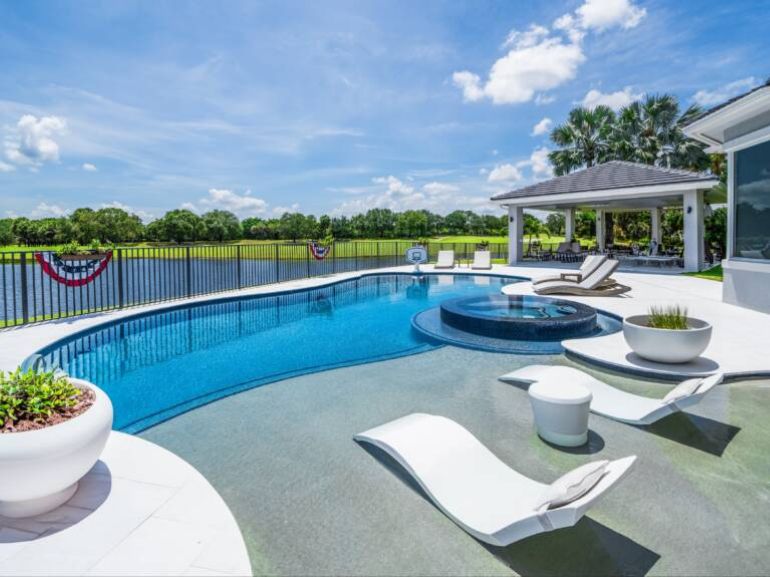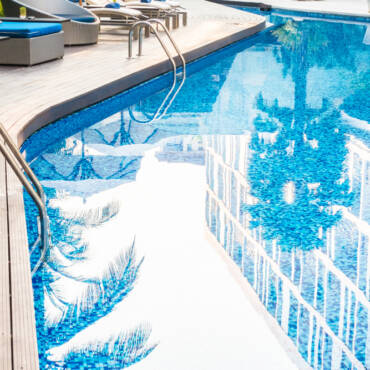Creating your backyard oasis involves several decisions, and one of the most critical is choosing between a saltwater pool and a traditional chlorine pool. Both offer unique benefits and considerations, impacting factors such as maintenance, cost, and overall enjoyment. In this comprehensive guide, we’ll delve into the debate of salt vs chlorine pool to help you make an informed decision for your aquatic retreat.
Understanding the Basics
1. Chlorine Pools:
- Composition: Chlorine pools use traditional chlorine chemicals, typically in the form of tablets, granules, or liquid, to sanitize the water.
- Sanitization Process: Chlorine works by releasing hypochlorous acid, a powerful disinfectant, into the water to kill bacteria, algae, and other contaminants.
- Maintenance: Regular monitoring and adjustment of chlorine levels are required to maintain proper sanitation. This often involves daily or weekly testing and adding chlorine as needed.
- Cost: While initial setup costs may be lower, ongoing expenses for chlorine chemicals can add up over time.
2. Saltwater Pools:
- Composition: Despite the name, saltwater pools contain only a fraction of the salt found in seawater. They utilize a salt chlorine generator (SCG) to convert dissolved salt into chlorine through electrolysis.
- Sanitization Process: The SCG generates chlorine continuously, eliminating the need for manual addition of chlorine. This process creates a more stable chlorine level, reducing fluctuations and potential for overchlorination.
- Maintenance: While saltwater pools generally require less day-to-day maintenance than chlorine pools, periodic checks of salt levels and pH balance are still necessary. Additionally, the SCG may require occasional cleaning and maintenance.
- Cost: Initial setup costs for a saltwater system are higher due to the purchase and installation of the SCG. However, long-term savings on chlorine chemicals can offset this investment.
Things to consider when choosing the right pool type
When choosing the right pool type for your backyard oasis, there are several important factors to consider between salt water pool versus chlorine. These include:
Budget:
Determine how much you’re willing to spend on initial installation as well as ongoing maintenance costs. Saltwater pools typically have higher upfront costs due to the installation of a salt chlorine generator, but they may save money in the long run on chemical expenses.
Maintenance:
Consider how much time and effort you’re willing to devote to pool maintenance. Chlorine pools require regular testing and adjustment of chlorine levels, while saltwater pools generally require less day-to-day maintenance but may need occasional checks on salt levels and pH balance.
Health and Safety:
Think about the health and safety implications for you and your family. Chlorine pools can cause skin and eye irritation if not properly maintained, while saltwater pools tend to be gentler on the skin and eyes. Additionally, consider the safety risks associated with handling and storing chlorine chemicals.
Environmental Impact:
Evaluate the environmental impact of each pool type. Chlorine pools can contribute to pollution through the disposal of chlorine byproducts and runoff, while saltwater pools may discharge salt into the environment through backwashing and splash-out.
Long-Term Durability:
Assess the long-term durability of pool equipment and materials. Chlorine can accelerate wear and tear on certain components, whereas saltwater may corrode metal fixtures over time. Choose materials that are resistant to the corrosive effects of both chlorine and salt.
Water Balance and pH Stability:
Consider how well each pool type maintains water balance and pH stability. Chlorine pools require frequent monitoring and adjustment of pH levels to ensure effectiveness and swimmer comfort, while saltwater pools may offer more stable pH levels due to the electrolysis process.
Personal Preference:
Ultimately, the decision may come down to personal preference. Some people prefer the familiar experience of a chlorine pool, while others appreciate the simplicity and perceived benefits of a saltwater pool. Consider factors such as your swimming habits, aesthetic preferences, and overall lifestyle when making your decision.
Swimming Experience:
Think about the type of swimming experience you desire. Some swimmers prefer the softer feel of saltwater on their skin, while others may not notice much of a difference. Consider visiting both saltwater and chlorine pools to experience firsthand how each feels and how it affects your swimming enjoyment.
Climate Considerations:
Take into account your local climate and how it may impact pool maintenance and comfort. In hot, sunny climates, chlorine pools may require more frequent chlorine additions to combat increased evaporation and algae growth. Saltwater pools may be more resilient to temperature fluctuations but may still require adjustments during extreme weather conditions.
Availability of Supplies and Services:
Consider the availability of supplies and services for each pool type in your area. Chlorine chemicals are widely available and familiar to most pool owners, while saltwater pool supplies and maintenance services may be less common in some regions. Ensure that you can easily access the necessary resources to maintain your chosen pool type.
Aesthetic Preferences:
Take into account the aesthetic aspects of each pool type and how they fit into your backyard design. Saltwater pools are often praised for their clear, sparkling water, while chlorine pools may require more effort to achieve the same visual appeal. Talk to Boca raton pool companies about how each pool type complements your landscaping, hardscaping, and overall outdoor aesthetic.
Conclusion:
Choosing between a salt vs chlorine pool ultimately depends on your priorities, budget, and lifestyle preferences. While saltwater pools offer benefits such as reduced chemical exposure and lower day-to-day maintenance, they require a higher initial investment and may still pose environmental challenges. Chlorine pools, on the other hand, are more affordable upfront but require regular monitoring and addition of chlorine chemicals. Whether you opt for the simplicity of a saltwater oasis or the familiarity of a chlorine retreat, proper maintenance and care are essential for ensuring a safe and enjoyable swimming experience. By weighing the pros and cons of each option and considering your specific needs, you can create the perfect backyard paradise for years of aquatic enjoyment.
Looking to remodel your pool with the right type, connect with our pool remodeling service and our Romance Pools team will be there to help you out.



